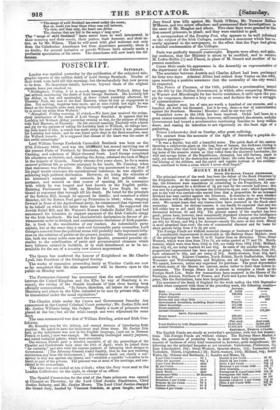Paris was perfectly tranquil yesternight. Reports were afloat, and gain-
ing credence, that the Ministry is about to be modified, and to receive M. Ledra-Rollin (I) and Flocon, in place of M. Senard and another of its present members. Count Mold made his appearance in the Assembly as representative of the department of the Gironde.
The armistice between Austria and Charles Albert had been prolonged for forty-two days. Admiral Albini had retired from Venice on the 16th, upon receiving a positive assurance that the neutrality of the city would be respected.
The Patria of Florence, of the 13th, publishes a proclamation issued on the 8th by the Sicilian Government, in which, after comparing Messina to Warsaw and Missolonghi for her heroic resistance, it calls upon the peo- ple for vengeance, decrees a levy en masse, and declares the war a struggle of extermination-
" Man against man, ten of ours are worth a hundred of our enemies, and a hundred are worth ten thousand. Let it be war, then—a war of extermination against the Bourbons. Messina! Messina! shall be our war-cry." Frankfort news to the 19th has been received. Order had been.to a great extent restored: the troops, however, still occupied the streets, andthe Government had issued a proclamation cautioning families to keep within doors, and stating its intention to act vigorously on the least sign of a gathering.
Prince Lichnowsky died on Sunday, after great suffering. We extract from the accounts of the fight of Saturday a graphic de- scriptive passage- " It was a fearful, but still a beautiful scene. The quick flash of the cannon throwing a sulphurous glare on the long lines of houses, the darkness closing in all the deeper after that livid light; the loud roar of the discharge, and thunder- ing noise of the massive stones as they rolled from the shattered barricades; the wild and savage forms of the Republicans, dismayed, but still furious, eager to rally, yet daunted by the destruction around them; the calm faces, and the mar- tial bearing of the soldiers, and the quick and regular motions of the artillery- men, combined to form a scene which I never shall forget.'


























 Previous page
Previous page